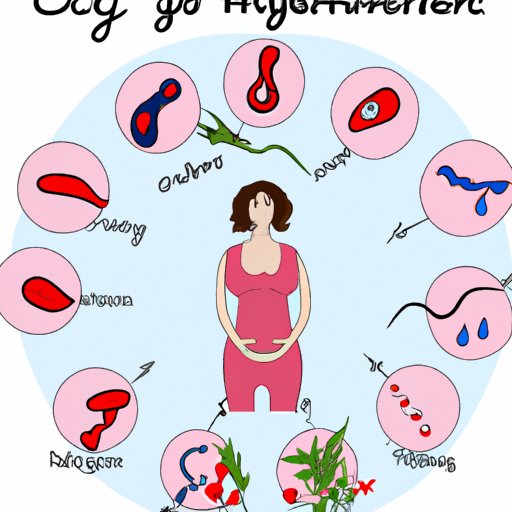Introduction
Fertility is defined as the natural ability to conceive or the capacity to produce offspring. It’s important to understand how your menstrual cycle affects fertility and what lifestyle changes you can make to increase your chances of getting pregnant. This guide will explore whether you can get pregnant right after your period and provide tips for increasing fertility after a period.
How Your Menstrual Cycle Affects Fertility
The menstrual cycle is a regular monthly cycle of hormonal changes in a woman’s body that prepares her for pregnancy. During the cycle, an egg is released from the ovary and travels down the fallopian tubes. If it is fertilized by sperm, it will implant in the uterus and a pregnancy will occur. If not, the lining of the uterus will shed and result in a menstrual cycle.
The hormones involved in the menstrual cycle play a key role in fertility and reproductive health. An imbalance in these hormones can lead to irregular periods, which can make it difficult to determine when you’re most fertile. This can make it more difficult to conceive, as timing plays an important role in conception.
Can You Get Pregnant Right After Your Period?
The timing of ovulation varies from woman to woman. Most women ovulate about 14 days before the start of their next menstrual period, but this can vary depending on the length of your cycle. Generally, you are most likely to get pregnant in the days leading up to and immediately following ovulation.
Having sex during your period is perfectly safe, but it won’t necessarily increase your chances of getting pregnant. Sperm can survive in the female reproductive tract for up to five days, so if you have sex during your period, the sperm may still be viable when you ovulate. However, the chances of conception are lower than usual since ovulation occurs later in the cycle.
What Lifestyle Changes Can Help Increase Fertility After a Period?
Making certain lifestyle changes can help improve your fertility and increase your chances of getting pregnant. Eating a balanced diet rich in fruits, vegetables, whole grains, and lean proteins can help support reproductive health. Exercise can also help regulate hormone levels and reduce stress.
Managing stress is also important for fertility. Stress can interfere with hormone production, which can affect ovulation and the menstrual cycle. Practicing relaxation techniques such as yoga, meditation, and deep breathing can help reduce stress and promote overall wellbeing.
How Long Does It Take to Get Pregnant After Your Period?
It can take several months to conceive after a period, depending on various factors. Age, overall health, and lifestyle all play a role in fertility. A healthy couple under the age of 35 who has frequent unprotected sex has a 20-25% chance of conceiving within one month.
If you’ve been trying to conceive for over a year without success, it’s a good idea to speak to your doctor about possible fertility issues. They can run tests to check for any underlying conditions that may be preventing you from getting pregnant.

Common Causes of Infertility After a Period
There are several common causes of infertility after a period. Hormonal imbalances such as polycystic ovarian syndrome (PCOS) can disrupt ovulation and prevent conception. Age is also a factor, as fertility tends to decline with age. Genetics can also play a role, as certain genetic disorders can cause infertility.
Other causes of infertility include endometriosis, uterine fibroids, thyroid problems, and male infertility. In some cases, the cause of infertility is unknown. If you’ve been trying to conceive for a while without success, it’s a good idea to speak to your doctor about possible fertility issues.
Conclusion
In conclusion, understanding how your menstrual cycle affects fertility is key to increasing your chances of getting pregnant. Having sex during your period may not increase your chances of conception, but making certain lifestyle changes such as eating a balanced diet and managing stress can help improve your fertility. Common causes of infertility after a period include hormonal imbalances, age, and genetics. If you’ve been trying to conceive for a while without success, it’s a good idea to speak to your doctor about possible fertility issues.
For couples trying to conceive, it’s important to focus on overall health and wellbeing. Eating a balanced diet, exercising regularly, and managing stress can all help increase your chances of getting pregnant. Finally, don’t forget to enjoy the process! Having fun and relaxing together can help you feel closer and more connected.
(Note: Is this article not meeting your expectations? Do you have knowledge or insights to share? Unlock new opportunities and expand your reach by joining our authors team. Click Registration to join us and share your expertise with our readers.)
